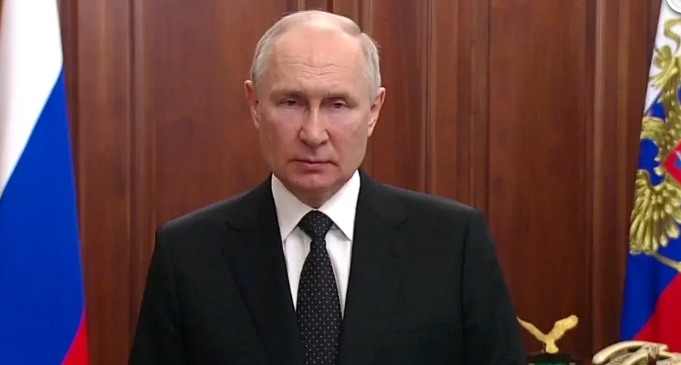..
Wagner fears ‘wounded’ Putin, could launch purges like
‘never seen before’: UK official
By Lee Brown, NYPost
June 26, 2023 8:08am Updated
Russian President Vladimir Putin likely feels “mortally wounded” by the weekend’s military mutiny — risking purges “like we’ve never seen before” and even the possibility of a full-scale “collapsed Russia,” according to UK officials.
Alicia Kearns, the chairman of the UK’s foreign affairs select committee, told LBC Radio that the attempted coups by the powerful Wagner Group over the weekend created a “really dangerous inflection point.”
Wagner Group never really intended a coup, according to Prigozhen, he just wanted fair treatment from the Russian military for his troops.
“The risk of a collapsed Russia is not insignificant,” she warned of the country with the world’s largest nuclear arsenal.
“We don’t know how far Putin will go to keep power, but let’s consider it to be significant. If he’s successful, we will see purges, I think, like we have never seen before,” the senior politician said.
Only if you have forgotten about Stalin.
She also warned that “what could come next could be a lot worse.”
AP
“There are no good options here and I think we really should be worried,” she said.
Although Wagner leader Yevgeny Prigozhin — a former top Putin ally — seemingly agreed to turn back from Moscow and accept amnesty in Belarus, Kearns warned that the upheaval “is definitely not over.”
“No one believes that Prigozhin is going to Belarus and live out his life quietly there,” Kearns told the Daily Mail.
“No one believes that Prigozhin is going to Belarus and live out his life quietly there,” Kearns said of the Wagner chief.
AP
“Putin … is mortally wounded but I don’t think anyone can say Putin is finished,” Kearns warned, saying that the revolt “has raised questions about the wholescale stability of the country.”
Doesn't 'mortally wounded' mean you are 'finished'?
Kearns said the UK government “knew for a few days that something was coming” — suggesting that other dark forces were involved in Russia given how Putin appeared to have been blindsided by the revolt.
“Did Russian intelligence not believe he [Prigozhin] was capable of marching on Moscow or did they lie to Putin because they were scared of him?” Kearns asked.
The UK knew for days that something was coming, raising the possibility that Putin’s military kept it from him.
AFP via Getty Images
Senior UK government sources also told the Times of London that the West “must prepare for a whole range of different scenarios.”
“From the very beginning of the invasion [of Ukraine], one of the most obvious scenarios was that the war could lead to political unrest back home in Russia,” one senior UK government source told the UK paper.
But this is not about 'political unrest', it is about 'military mistreatment', and, I believe, that's all it's about.
“We have to wait, watch and see what comes next,” another said. “This could be chapter one of something new.”
Kearns said she “would just urge caution” from those hoping to see the back of Putin, noting that history has taught that military coups typically end with “some sort of military, far-right extreme rule.”
That's the most intelligent thing she has said.
John Foreman, the former British defense attaché in Moscow, told the UK Times that Prigozhin toppling Putin would actually be the “worst-case scenario.”
“You’ve got to be careful what you wish for,” he said. “Prigozhin is not some sort of liberal, peace-loving democrat. He’s a fascist.”
A country that is weakened politically will often resort to increased military aggression in order to stabilize itself. The fall of Putin could mean the beginning of WWIII.
Germany’s far-right AfD party wins historic victory in local election
Germany's far-right AfD won its first district election Sunday, a further boost
to the anti-immigration party as it surges to record highs in opinion polls.
Issued on: 25/06/2023 - 21:44
2 min
Text by: NEWS WIRES
Robert Sesselmann of the far-right Alternative for Germany (AfD) party is pictured at an election event in Sonneberg,
eastern Germany on June 25, 2023. © Martin Schutt, AFP
Robert Sesselmann, a lawyer and regional lawmaker, came out on top in a closely watched runoff vote for district administrator in Sonneberg in the central state of Thuringia, near the border with Bavaria.
Sesselmann took 52.8 percent of the vote, according to the electoral office.
The victory came despite appeals from mainstream parties for voters to rally behind the incumbent candidate, Joergen Koepper from the conservative CDU.
With only around 57,000 people, Sonneberg is one of Germany's smaller districts, but the landmark victory makes it the first to be run by the Alternative for Germany (AfD) party.
"Robert Sesselmann has made history," tweeted AfD co-chief Alice Weidel.
The milestone comes as recent surveys put support for the AfD at a record 18 to 20 percent, neck-and-neck with Chancellor Olaf Scholz's Social Democrats and behind only the conservative CDU/CSU bloc.
The AfD is polling even better in the former communist East German states of Thuringia, Brandenburg and Saxony, which will see regional elections next year where the AfD is hoping to score major breakthroughs.
Germany's best-selling Bild newspaper called Sesselmann's win a political "earthquake" and "a remarkable success for the ultra-right party".
Thuringia's interior minister Georg Maier, from the Social Democrats, called the outcome "an alarm bell for all democratic forces", according to Bild.
More like an alarm clock trying to wake up the fools running the country.
The AfD's regional party leader in Thuringia is the far-right firebrand Bjoern Hoecke, whose past statements on Germany's Nazi past have caused outrage.
Hoecke, considered an extremist by German intelligence services, has called Berlin's Holocaust monument a "memorial of shame" and urged a "180-degree shift" in the country's culture of remembrance.
Created in 2013 as an anti-euro outfit before morphing into an anti-Islam, anti-immigration party, the AfD has benefited from growing discontent with Scholz's three-party coalition amid concerns about inflation and the affordability of the government's climate plans.
High immigration also remains a key voter concern.
The AfD stunned the political establishment when it took around 13 percent of votes in the 2017 general elections, catapulting its lawmakers into the German parliament.
It slid to around 10 percent in the 2021 federal election.
In Germany, where coalition governments are the norm, mainstream parties have always ruled out forming an alliance with the AfD.
(AFP)






No comments:
Post a Comment